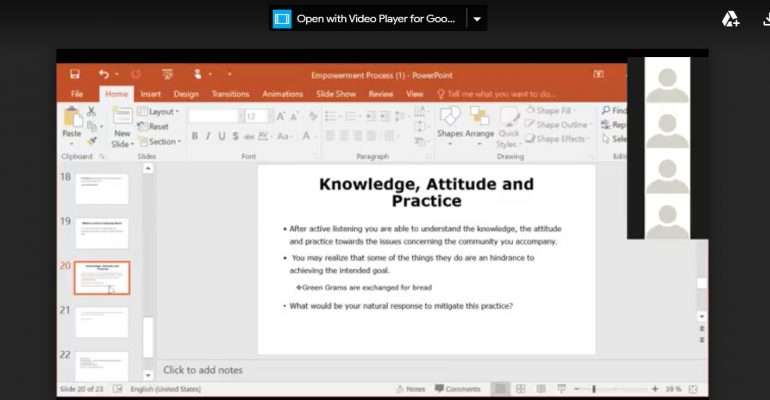By Caleb Mwamisi
What would you do if you donated green grams to mothers to feed their young ones for a balanced diet, and you realized that the same was being sold for bread to be bought?
The above is a question which was posed by trainers, Dr. Paschalia Mbutu and Dominic Syuma on the third day of training as they undertook to sharpen the skills of members of the AJAN network, on 14ème July 2020. The question presents a puzzle for an implementer of a project who, with a clear grasp of nutrition, avails green grams for the benefit of malnourished children.
Nonetheless, the mothers of the children do not appear to take this with the weight it deserves and instead proceed to sell the green grams for the purchase of bread to give their beloved children. They obviously, do not hate their children, but they find bread more nutritious or have no idea about the difference.
The answer to this question can only be found through closer examination of the culture, practices, and expectations of the community one is accompanying. The complexities of engaging communities were diagnosed through similar questions as this to prepare participants to evade certain ‘landmines’ in project execution. “It is necessary to listen to the community to understand what may be lurking in the background. Once you decipher these, then you can be able to successfully influence the community so that a new and appropriate practice can be born”, said Dr. Paschalia.
The trainers methodically presented various barriers to the subject of listening which project implementors need to be aware of. For instance, the act of ‘mind-reading’ denies one vital learning points and the active participation of the community he intends to help. “It is a serious mistake making judgments and interpretations only to confirm information you hitherto received. The ideal is to start from solid knowledge so that you can be able to influence the practice you wish to correct, instead of undertaking to knock down the practice from the onset.”, said Dominic. “It is a losing battle to fight a practice without knowledge.”, he added.
Further, it was explained in depth how failure to actively listen, arguing or being carried away by emotions in dire situations can lead to certain failure. At the end of the training, it was crystal clear to participants, that paying attention to more than the words one hears is critical. There is no doubt that participants are raring to experience the fourth session of training.

